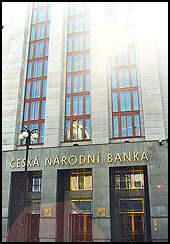 Financial sector Financial sector |

The recession was also helped by the credit crunch started in 1998 as banks' loan portfolios were quickly deteriorating. The primary cause was the coupon privatization method, used on most state-owned enterprises. The shares in these companies were distributed in two rounds among the citizens bringing no new management, know-how and money, while only a few companies were sold directly to western companies (the car maker Skoda Auto, now a successful part of the Volkswagen group, is a prime example). However, coupon-privatized companies had no other source of capital besides bank loans - and the governmental pressure to lend them was heavy. The pressure to lend coupled with inadequate credit risk management systems led to lending to companies that would otherwise be denied funding, while the inadequate bankruptcy and foreclosure laws prevented banks from limiting their losses. The heavy burden of required provisioning also meant the state-owned banks had only limited resources to develop new products and improve their processes, opening up the market to foreign banks.
Around 1998, the Czech banks' ability to support failing industrial companies was stretched to limit. Many small local banks have by then been closed down or merged with a larger financial institution and the banks in general almost stopped issuing new loans, cutting a lot of companies - including many viable ones - from the only source of capital. While it was a rather drastic measure, it helped the banks to focus more on risk management and also enabled them to prepare for their privatization. Out of the four large state-owned banks - Ceska sporitelna, CSOB, Investicni a Postovni banka (IPB) and Komercni banka - IPB was the first to be privatized. IPB was a case to show how privatization of a bank can be mishandled. When the state lost its majority stake by not participating in a capital increase, the Japanese investment bank Nomura stepped in to sweep the bank that has held many valuable industrial assets, including the largest two Czech breweries. Nomura started to sell off IPB's industrial holdings while also expanding aggressively on the banking retail market. However, it was an expansion at a price - the losses, artificial lowering of the bad debts ratio and unwillingness of Nomura to further finance the bank has forced the Czech National Bank to put IPB under forced administration in June 2000 to prevent complete meltdown. Within three days, the appointed administrator sold IPB with its daughter companies to an up-and-coming competitor, CSOB, thus creating the largest bank in the Czech Republic.

The second bank privatization - CSOB - concluded in June 1999 was the complete opposite of the mishandled IPB case. CSOB, that has traditionally focused on financing international trade and boasted the best and most careful bank management in the Czech Republic, has had a rather healthy loan portfolio and untarnished image. This led to a wave of interest, with German Deutsche Bank and HypoVereinsbank and Belgian KBC outbidding one another. KBC has won in the end and is now turning CSOB into a retail bank. The third privatization, of Ceska sporitelna, has been concluded at the beginning of 2000, with the Austrian Erste Bank taking over the largest Czech retail bank. The last one to be sold is Komercni banka, until the acquisition of IPB by CSOB the largest bank in the country with a strong position in both commercial and retail banking. As it has acted as a combined corporate and retail financial institution, it has had the worst loan portfolio due to the heavy pressure to lend to newly privatized Czech companies in the mid-90's, irresponsible management disregarding basic risk management rules, and economic problems of many of its large clients. 
| However, the bank has undergone several rounds of government-funded cleanup and another round is expected before the privatization to limit the exposure of the bank's new owners. "The bank will be more attractive after the restructuralization of its portfolio and under new management," Finance Minister Mertlik explains why the state fired previous bank managers in spring and why it will keep pouring money into the bank.

"Bank privatization certainly isn't a profitable activity but I believe that we will begin to see some benefits in three or four years," says Jan Mladek, Deputy Finance Minister and one of the main authors of the current government's economic and privatization policy. Kamil Ziegler, chairman of the board of directors and managing director of Konsolidacni Banka can undoubtedly attest to the first part of Mladek's statement. Konsolidacni banka was founded in 1991 as a state-owned bank to help the government deal with some of the transformation issues. The bank has now evolved into a multi-function institution, with its main purpose being the caretaker of the bad loans transferred to it from the commercial banks before their privatization. As it often capitalized the debts, Konsolidacni banka has quickly become a major shareholder in many large Czech companies.
"Therefore, the bank also plays a major role in the current restructuring and revitalization process that aims to find new investors for large Czech companies," explains Ziegler. The most complicated and sensitive cases are being administered by the Revitalization Agency, founded by Konsolidacni banka but administered independently by a consortium of two foreign, well respected advisors and investment bankers, Lazards and Latona Associates.
All banks have changed significantly in the last few years, both in the terms of offered products and distribution channels. "To be an universal bank, you must develop personal banking, as well as corporate banking and investment banking," says Jiri Kunert, chairman of the board of directors and chief executive of Zivnostenska Banka, the oldest Czech bank established in 1868. Especially in retail banking, number of distribution channels has been growing quickly and while branch network still remains the primary sales point, more and more banks offer full-service call centers, GSM banking or internet banking services. And even though the costs of preparing new distribution channels is huge, bankers agree it will bring long-term savings and open them new opportunities. "Modern technology allows us to expand our distribution network very quickly, as new branches are usually staffed by only a few people and many labor-intensive transactions are handled via self-service kiosks, phone or internet banking," explains Kunert.
The increased focus on retail banking in the last two years has brought an enormous expansion of non-traditional financial products offered by the banks, their daughter companies and independent financial institutions. The first sector to grow were building societies, offering a five-year savings plan with guaranteed returns. Mutual funds have taken off during 1999, and even though they still manage only about 4% of the Czechs' savings, the money keeps coming in, both to the Czech and foreign mutual funds. Foreign mutual funds should see further boom next year, as the rules for their distribution will be relaxed and the Czech market will become more open. Pension funds, endowment and unit-linked insurance seem to be the next growth areas, as the government approved tax incentives for long-term savings and as the debate about the future of the Czech pension system is slowly picking up.
Interest in non-traditional financial products might bring a revival to the Czech stock market as well. The interest in foreign (especially US) stocks has already been growing steadily, opening new possibilities for asset managers, some of which (for example Private Investors) even started offering online investing on the US markets. |

